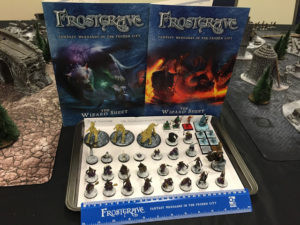This post is inspired by Wargamer Fritz’s Youtube video “Are You a Rules Lawyer.” It can be considered my response to the question that he posed to the online community. A link to Fritz’s site and an embedded link to the original video can be found at the end of this article.
In this video, Wargamer:Fritz discusses what a Rules Lawyer is, discusses how to deal with them and asks his viewers whether they are a Rules Lawyer. Fritz and I play different rule-sets, but the concepts and situations are very much the same.
At its most basic level, a Rules Lawyer interprets the rules of the game literally. Am I a Rules Lawyer? It really depends on the setting. In a casual game, usually not.
In a tournament setting, absolutely. The rules of the game are part of the social contract that we enter when we gather to play our games. Before a tournament, I will study the rules as much as I can to go prepared. I hope for the same from my opponent. That said, I am a fair opponent and a good sportsman. I play for fun and don’t mind whether I win or lose. I will politely correct my opponents and challenge them on their interpretations of the rules when I see them making mistakes (regardless of whether it is in their favour or mine). I hope they will do the same for me.
While I consider myself a “Friendly Rules Lawyer,” there are other Rules Lawyers out there that are more unscrupulous. Some learn the rules inside-and-out and abuse loop-holes to win their games. Others are not really Rules Lawyers, but they are so confident in themselves, that they trick you into thinking that they know the rules inside-and-out when they really don’t. I find the second type harder to deal with than the first.
Those that Don’t Know the Rules but Exude Confidence
There have been two instances (for sure) where someone’s confidence deterred me from challenging them on the rules when I should have. Both Instances were in Flames of War tournaments (WW2). To combat these situations, you really have to be a bit of a Rules Lawyer yourself.
The first instance was against a young opponent playing as a Soviet Union Infantry Horde Army. In this army, every single unit of his had something called “Smoke Pots.” Being unfamiliar with the Special Rules for Soviets, I asked what the smoke pots do. I was told that they provide concealment to his army so that they cannot be shot at when they assault (no Defensive Fire). Next thing I know, I learn that two of his large units also have the Infiltrate special rule. Within the second and third turns, I had his huge infantry blobs assaulting my German Heer Gun-Lines with nothing I can do to stop him.
His units assaulted my positions and destroyed them without giving me the opportunity of Defensive Fire. I let him know that I felt that his special rule was overpowered and graciously cried cheese as he defeated my army. After the tournament, I read an article on WWPD about the new rules in the Berlin Book to find that the youngster either misinterpreted the rules or blatantly lied about them.
Smoke Pots – During an Assault, a platoon with these can make any number of teams non-assaulting teams and makes skill check. If any team passes this check, the assaulting platoon (company) is considered Concealed. From WWPD
This is an instance where I should have been a Rules Lawyer and made him produce the rules from his Army Book. Having “Smoke Pots” provide the unit with Concealment is a hell of a lot different than Preventing Defensive Fire. I likely would have won that game (or at-least had a draw) as there would be no way for this player to assault my gun-lines. My gun-lines simply had too much fire power to be assaulted (even if his forces were concealed). If I remember right, this guy placed really well during this tournament.
The other instance was more of a general instance where a Rules Lawyer used his abilities to his advantage in a timed tournament. In this tournament, we had chess clocks with an-hour-and-a-half per side. The clocks were supposed to be used in Deployment and during the game. We forgot to start the clocks and I set up as the defender in 5-minutes while he, as the attacker took about 20 to 30 minutes to set up as he purposely measured to make sure every unit was spaced perfectly so he would only take one casualty if I ever aimed artillery at him. When I realized that he was using such precision, I asked if it would be okay if I did the same to do the same to my artillery. His response was that he is sorry, but I already deployed and it is not his fault that I deployed my guns too close to each other. He would not be okay with me re-positioning them. Fair enough, my deployment time was done.
I then realized that the chess clocks should have already been started, and when I pointed that out to him, he stated that they weren’t on during my deployment so it shouldn’t be on during his. He then took ten minutes more to set up and he was ready to go. I was not happy at this point as he was really taking advantage and milking the time to perfectly set up his forces.
This signaled to me that I was against an opponent that would work all of the rules to his advantage. He started right off the top by taking his time with deployment. We were playing at his “native” club and he is a tournament regular there so he should have known about the chess clocks during deployment and I found myself a little bitter with him for taking advantage and taking so long to deploy. Once we started playing, he let me know that he doesn’t normally play against Infantry Armies and started asking me to produce the rules and page numbers to all of the special rules for infantry (from cover to movement) while we played. Of course, all of these questions came up during my turn while the chess clock was counting down on my side.
In these games, if your chess clock reaches zero – the opponent gets a large quantity of bonus points. This acts as motivation for you to keep the game running quickly. Fortunately, I did not time out, but it really felt like he was trying to drain my time by being a naive rules lawyer on my turns to get those extra bonus points. This player was much more experienced than me so it really felt odd that he had the questions that he did. He also took advantage of every rule he could to help him win the game from precise measurements (and interpretations of millimeters) to confidently telling me that the rules that should protect my Infantry forces do not apply (and he demanded that I produce the pages to prove him wrong – which I did). It is a good thing that I am a bit of a Rules Lawyer myself. If I wasn’t, this game would have been an absolute slaughter for my forces rather than just a defeat.
This game was very unpleasant for me as this guy really used the rules to his advantage while challenging me on every rule he was unfamiliar with while the chess clock was counting down on my side. At the end of the game, he apologized for not giving me the chance to move my guns in my deployment zone and stated that he wanted to give me a “learning opportunity” and that if he let me move my guns a little that I would not know better for my next games. Thanks for the “learning opportunity.”
Years later I remember that lesson well, but even more I remember how slimy it felt playing against this guy. Not a pleasant experience and somewhat exhausting to reflect upon. When it came time to scoring our opponents, I gave him a 1 out of 10 for Sportsmanship. Usually I score my opponents 8 to 10 out of 10 in this category. The tournament organizer asked if I was sure about the score and I told him “yes, this guy is not pleasant to play against at all.” I didn’t know it at the time, but that score in sportsmanship was enough to push him from second or third place overall to fourth.
While the two instances above are from Flames of War tournaments, please keep in mind that I have participated in many Flames of War tournaments and these instances are not the norm. Most players are very good at playing fair and not twisting the rules to their advantage.
The Real Rules Lawyers
Now these guys are the guys that know the rules inside and out and interpret everything literally. There is nothing wrong with that in my opinion, but some of these people find the loop-holes and use that to their advantage while they play. Some will even let you make mistakes during your turn to their advantage (without correcting you) and then play the rules correctly on their turn (also to their advantage).
Often, their excuse is that if you are playing in a tournament setting that you should know the rules well enough that you don’t have to rely on your opponent to help you along. The bad ones will go further and reiterate that it is not their job to help you with the rules and will use the rules to absolutely crush you in the game.
I know I am against a Rules Lawyer when I hear the phrase, “the rules as written” in a sentence about the game. These guys tend to not care more about how the rules were written than what the writers may have actually intended. That said, not all Rules Lawyers are bad with the intent to crush their opponents through the rules. There are plenty of good Rules Lawyers out their and many of those good Rules Lawyers make the best teachers when you are learning a new system (or even learning more about a system that you have played for years).
I certainly don’t mind facing off against a Rules Lawyer myself as long as everything is kept fair and consistent in the game. Fair and Consistent is the key phrase here.
For the Rules Lawyers that are corrupt, the best defense I have found is knowing the rules and being a bit of a Rules Lawyer yourself. My top three weapons against Corrupt Rules Lawyers is as follows…
- Errata and FAQs
- Discuss Potential Points of Contention Before the Game
- Demand Consistency
Many games companies know that there are people that use loose interpretations of the rules and “the rules as written” to their advantage. To help limit these situations, they have produced Errata and FAQ documents. Often, I find it surprising how many people don’t know the Errata. This Errata usually bring the rules from the “rules as written” to be more in line with the “rules as intended.” In my experience, these documents tie up the loose ends in the rules and help prevent people from taking advantage of rules that just don’t sound right. So far, every tournament organizer I have played under has accepted these rules and will rule in favour of the Errata and FAQs when issues arise. Know the Official Errata and bring the FAQs with you to your tournaments.
Next up on the list is to discuss every potential item on the table that could be subject to interpretation before the game. Discuss every piece of cover and terrain before the game starts and sort out disagreements before the models are even put on the table. Perhaps agree to dice off during the game for how to interpret something in case an item is missed. Also be sure to discuss any club or house rules that may be in effect for the game. Once these items are discussed, keep things consistent for the entire game.
Rightly or wrongly, make sure to let your opponent know that you expect consistency on the rules through out the entire game. If your guy can fire on me, my guy can fire on you. If you interpret the rules one way, we play the rules the same way through out. If you see me making a mistake, correct me or we will be playing the rules the same way through out the game. By demanding consistency, the rules are kept fair – even if the rules are misinterpreted by both sides.
Casual Games
As stated earlier, I am different in a Casual Games setting. In a casual setting I am much less of a rules lawyer and will often lean more to the side of playing the game as the spirit of the game would suggest rather than what is literally on the page. Win or lose, I am typically just out for fun so I am fairly laid back. I don’t mind dicing off for disagreements on the rules and keeping the game moving.
Currently, most of the games I play are in a casual environment.
Wrapping it Up
So there you have it. I am absolutely a Rules Lawyer in a Tournament setting and a bit more relaxed in a Casual Environment. Currently, I play more games Casually than in a Tournament setting.
For those that are curious, the games that I have played in a Tournament setting include Flames of War, Bolt Action, Frostgrave and X-Wing. The games that I play Casually or have interest in are too many for me to list here.
How about you? Are you a Rules Lawyer? How do you deal with people that take literal interpretations of the rules to their advantage?
Below is the original video that inspired this article. Wargamer Fritz also runs a Blog in addition to his Youtube Channel.
Until next time, Happy Gaming Everyone!!!





Most people apply a very negative connotation to the phrase "rules lawyer", not recognizing that some people really care about precision in the language of the rules. Most use the term to mean "someone who twists poorly worded rules to their advantage, even if the argument they are making is absurd.